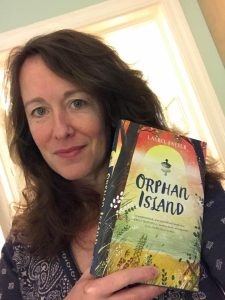by Kitty Felde
When it comes to playwriting, I’m pretty confident. I’m pretty good at character and dialogue, though my plotting could use a lot of work. And I know the basics about how to format a draft that is acceptable for submission.
But I’ve learned a hard lesson of late: I don’t remember a thing from 5th grade grammar class.
Apparently it didn’t matter in my career as playwright and radio journalist. Nobody really cares where you put your commas. There are no quotation marks. You never have to worry about tense in radio reporting: live spots are always in present tense; radio features are told in past tense. Plays on the other hand always take place in the “now” – even when we’re having onstage flashbacks to past events.
Why this trip down grammatical worry lane? I have my first “prose” book coming out in late February and correcting the galleys has made me realize that as a writer, I really don’t know what the heck I’m doing.
The book is a middle grade novel, “Welcome to Washington, Fina Mendoza.” It’s the tale of the ten year old daughter of a congressman who solves the mystery of the Demon Cat of Capitol Hill to save her family from “cat”astrophe.
The publisher, Black Rose Writing, is a small indie house out of Texas that pretty much requires you to be your own editor. That means it’s my job to identify all the grammar mistakes. And there are many.
I never realized what a messy writer I am – throwing dashes and commas into the same sentences and (what do you call these things that I usually use as smiley faces in texts?) I had to look up whether to capitalize the first word in a quote and whether the period goes before or after the quotation mark. I’m pretty good with apostrophes, but what about phrases like “kids book?”
I slip back and forth through tenses without considering the poor reader. Even re-reading this blog post is sending shudders through my heart.
I have half a dozen writing manuals on my desk. And I use a “bible” – a text by a writer that I admire. I flip through the pages to see how she solved a particular grammar issue.
I’m lucky to be married to a guy who has even more writing books on his shelves than I have on mine. (I was going to write “than I do” but was unsure of the grammatical correctness…) I can walk down the hall to query him about various rules. But even he was stumped from time to time.
It’s enough to make you want to give up writing.
On the other hand, how many times are we given the opportunity to learn something new? Something hard. Something useful.
I like the idea of switching back and forth between writing for the stage and writing books for kids. I want to feel as confident about the latter as I do (sometimes) about the former. I want to be a writer!
But I am still looking for the perfect grammatical writing book. Any suggestions?






